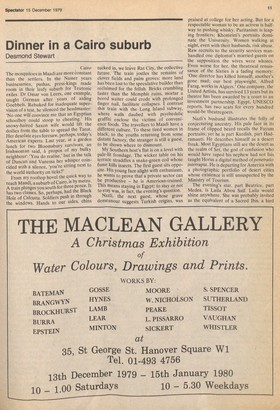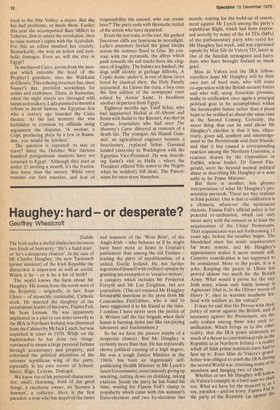Dinner in a Cairo suburb
Desmond Stewart
Cairo The mosquitoes in Maadi are more Constant than the settlers. In the Nasser years businessmen, pashas, press-kings made room in their leafy suburb for Teutonic exiles. Dr Omar von Leers, one example, taught German after years of aiding Goebbels. Rebuked for inadequate supervision of a test, he silenced the headmaster: `No one will convince me that an Egyptian schoolboy could stoop to cheating.' His snowy-haired Saxon wife would lift the doilies from the table to spread the Tarot. Her desolate eyes foresaw, perhaps, today's American experts. Last year, at a garden lunch for two Bloomsbury survivors, an Irishwoman said, a propos of my bulky neighbour: 'You do realise,' but in the talk of Duncan and Vanessa her whisper coincided with a silence, 'you're sitting next to the world authority on ticks?'
From my rooftop hovel the quick way to reach Maadi, a suburb of Cairo, is by metro. A train plunges you south for three pence. It has two classes. So, perhaps, had the Black Hole of Calcutta. Soldiers push in through the windows, Hands to our sides, chins tucked in, we leve Rat City, the collective future. The train jostles the remains of clover fields and palm groves: more land has been lost to the speculative builder than reclaimed for the fellah. Bricks crumbling faster than the Memphis ruins, mortar a bored waiter could erode with prolonged finger nail, facilitate collapses. I contrast this train with the Long Island subway, where walls daubed with psychedelic graffiti enclose the victims of convenience foods. The travellers to Maadi have a different culture. To these tired women in black, to the youths returning from some distant factory, the stranger is still a guest, to be shown where to dismount.
My Southern host's flat is on a level with pale-lit frondage. The wicker table on his terrace straddles a snake-green coil whose fume kills insects. The first guest sits opposite. His young face alight with enthusiasm, he wants to prove that a private sector can be productive — he is American-trained. This means staying in Egypt: to stay or not to stay was, in fact, the evening's question. Nazli, the next guest, whose grave demeanour suggests Turkish origins, was praised at college for her acting. But for a respectable woman to be an actress is halfway to pushing whisky. Puritanism is leaping frontiers; Khomeini's portraits dominate the University. Women walking at night, even with their husbands, risk abuse. Raw recruits to the security services manhandled one diplomat's married guests on the supposition the wives were whores. Even worse for her, the theatrical renaissance of the Sixties is a fading memory: 'One director has killed himself; another's gone mad; our best playwright, Alfred Farag, works in Algiers.' One company, the United Artists, has survived 13 years but its theatre has been awarded by a court to an investment partnership. Egypt, UNESCO reports, has two seats for every hundred would-be theatregoers.
Nazli's husband illustrates the folly of conjecturing ancestry. His pale face in its frame of clipped beard recalls the Fayum portraits; yet he is part Kurdish, part Hadramauti. He describes himself as a desert freak. Most Egyptians still see the desert as the realm of Set, the god of confusion who would have raped his nephew had not Isis taught Horus a digital method of pen etratio interrupta . He is departing for America with a photographic portfolio of desert cities whose existence is still unsuspected by the Ministry of Tourism.
The evening's star, part Beatrice, part Medea, is Laila Abou Saif. Laila would shine anywhere. She was probably invited as the equivalent of a Sacred Ibis, a bird loyal to the Nile Valley: a stayer. But she has had problems; or made them. Earlier this year she accompanied Kate Millett to Teheran, first to salute the revolution, then to raise women's rights with the Ayatollah. For this an editor insulted her crudely. Remarkably, she won an action and symbolic damages. Even so, will she stay in Egypt?
In mediaeval Cairo, across from the mosque which entombs the head of the Prophet's grandson, rises the Wakkalat al-Ghoury. This echoing structure has, since Nasser's day, provided workshops for artists and craftsmen. There, in Ramadan, when the night streets are thronged with lamps and walkers, Laila planned to mount a tribute to Jacob Samua, the Egyptian Jew who a century ago founded the Cairo theatre. At the last moment she was forbidden to continue by officials using arguments she disputes. 'A woman, a Copt, producing plays by a Jew in Ramadan: you would be lynched.'
The question is repeated; to stay or leave? Since the October War thirteen hundred postgraduate students have not returned to Egypt. 'Although they start at under 25 sterling a month, it's the frustration more than the money. While envy remains our first emotion, and fear of responsibility the second, who can create here?' The party ends with threnodic recital of the artists who have departed.
From the last train, to the east, the gashed limestone cliffs are luminous in moonlight. Laila's ancestors ferried the giant blocks across the summer flood to Giza. By contrast with the pyramids, the alleys which push towards the rail tracks have the elegance of fragility. The babies are hushed; the dogs sniff silently at garbage hillocks. A Coptic dome: under it, in one of those caves loved by classical diety, the Holy Family sojourned. As I leave the train, a boy cries the first edition of the newspaper once edited by Anwar Sadat. It headlines another departure from Egypt.
Eighteen months ago Yusif Sebai, who had supplanted Haikal at Al-Ahrurri and flown with Sadat to the Knesset, was shot in Cyprus. Journalists who had seen The Mummy's Curse shivered at rumours of a death list. The youngist Ali Hamdi Gammal, an agricultural engineer become a functionary, replaced Sebai. Gammal landed yesterday in Washington with the Egyptian Vice-President. He was describing Sadat's visit to Haifa — where the President offered Nile water to the Negebwhen he suddenly fell dead. The Palestinians for once seem blameless.



































 Previous page
Previous page